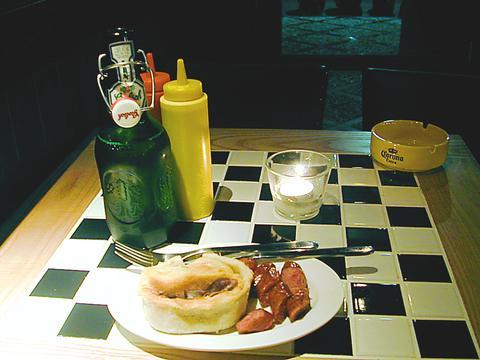It's maybe a little unusual to include a bar in a restaurant column, but occasionally someone will hang a shingle outside a new establishment that warrants a mention. Bobwundaye is such an establishment and the someone hanging the shingle is none other than Cathy Chiou, whom barflies may know better by her past incarnation, "Cathy at DV8."
For the unfamiliar, DV8 is one of the city's longest-running pubs (not to be confused with those establishments that serve beer with ice). For years it served as the penultimate square in a hopscotch of drinking holes that included 45, Spin, Roxy Plus (now Roxy 99), DV8 and Roxy Vibe in its previous location. Every Friday and Saturday night, the sidewalks connecting these locations became strewn with empty bottles and cans, cigarette butts and a few fallen comrades.
Not long ago, DV8 held a special, smoke-filled place in the hearts of barflies and was abuzz throughout the week. Cathy earned a special place, too, dispensing tequila like medicine to legions of battle-worn English teachers. Her departure has robbed the old barhopping circuit of the last of its charms and left behind only the bottles, cans and fallen comrades, who are wondering where Cathy went.

PHOTO: DAVID MOMPHARD, TAIPEI TIMES
Answer: Bobwundaye, where she's transcended the role of barmaid and become the boss (She wears the role well, too; standing several centimeters taller behind her new bar.)
Less than a month old, Bobwundaye offers all the trappings of a pub without the smoke-stained walls. At 14 ping, it's intimate to say the least, but a nice design and even nicer company make it more cozy than cramped. The menu, scratched on a board above the bar, consists of several sausages, excellent fries and some very tasty meat pies -- all served with the same friendliness and honesty that those who know Cathy take for granted. "Don't eat the chicken," she says. "It's not so good." All the pub grub runs around NT$100 to NT$150.
But of course the grub exists mostly to allow you to drink more and it's here that Bobwundaye wins the audience. From 9pm to 11pm, Heineken is 50 percent off at NT$60 per bottle, with other drinks specials later.

On April 26, The Lancet published a letter from two doctors at Taichung-based China Medical University Hospital (CMUH) warning that “Taiwan’s Health Care System is on the Brink of Collapse.” The authors said that “Years of policy inaction and mismanagement of resources have led to the National Health Insurance system operating under unsustainable conditions.” The pushback was immediate. Errors in the paper were quickly identified and publicized, to discredit the authors (the hospital apologized). CNA reported that CMUH said the letter described Taiwan in 2021 as having 62 nurses per 10,000 people, when the correct number was 78 nurses per 10,000

As we live longer, our risk of cognitive impairment is increasing. How can we delay the onset of symptoms? Do we have to give up every indulgence or can small changes make a difference? We asked neurologists for tips on how to keep our brains healthy for life. TAKE CARE OF YOUR HEALTH “All of the sensible things that apply to bodily health apply to brain health,” says Suzanne O’Sullivan, a consultant in neurology at the National Hospital for Neurology and Neurosurgery in London, and the author of The Age of Diagnosis. “When you’re 20, you can get away with absolute

May 5 to May 11 What started out as friction between Taiwanese students at Taichung First High School and a Japanese head cook escalated dramatically over the first two weeks of May 1927. It began on April 30 when the cook’s wife knew that lotus starch used in that night’s dinner had rat feces in it, but failed to inform staff until the meal was already prepared. The students believed that her silence was intentional, and filed a complaint. The school’s Japanese administrators sided with the cook’s family, dismissing the students as troublemakers and clamping down on their freedoms — with

As Donald Trump’s executive order in March led to the shuttering of Voice of America (VOA) — the global broadcaster whose roots date back to the fight against Nazi propaganda — he quickly attracted support from figures not used to aligning themselves with any US administration. Trump had ordered the US Agency for Global Media, the federal agency that funds VOA and other groups promoting independent journalism overseas, to be “eliminated to the maximum extent consistent with applicable law.” The decision suddenly halted programming in 49 languages to more than 425 million people. In Moscow, Margarita Simonyan, the hardline editor-in-chief of the